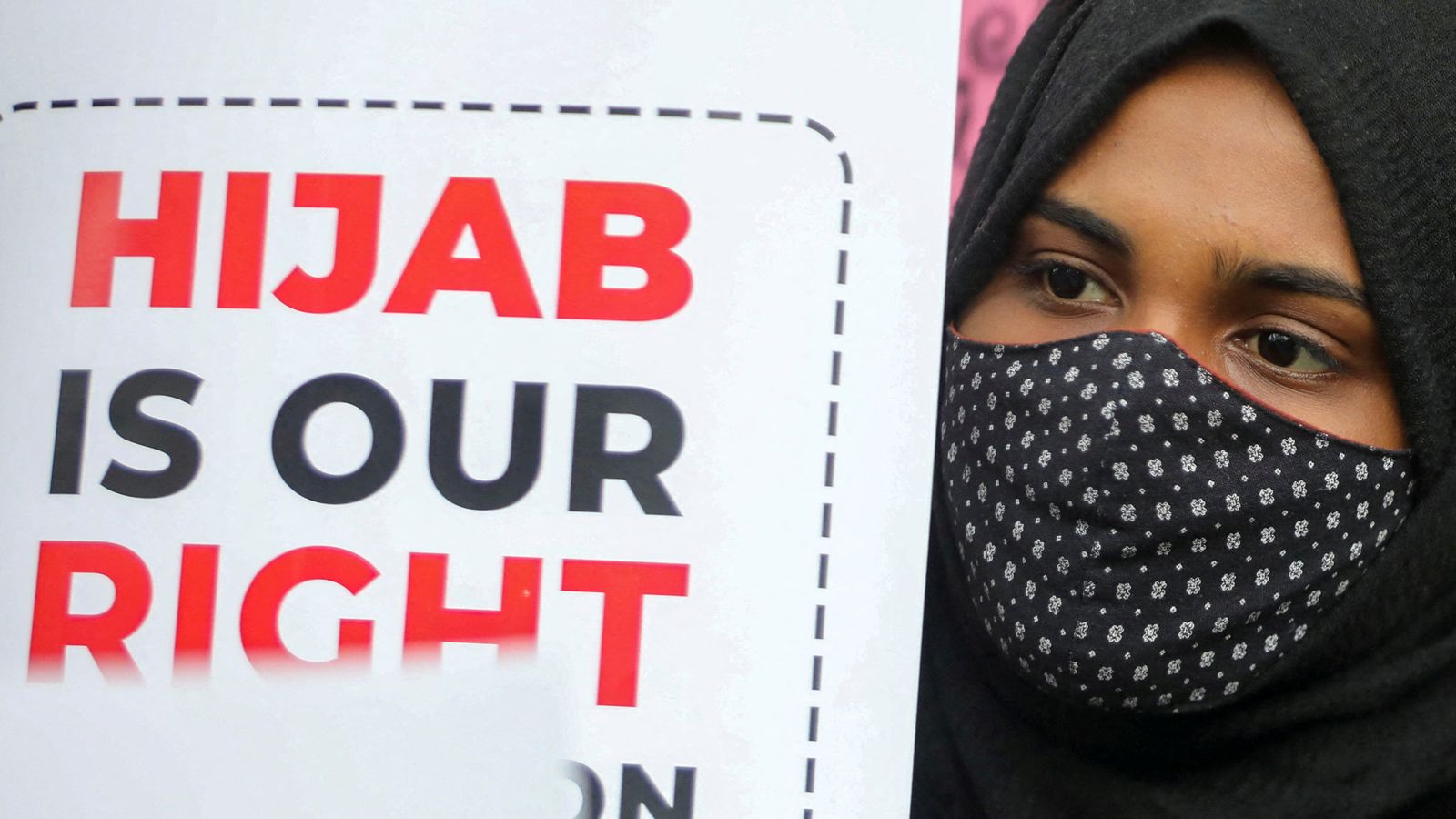Protests over girl students wearing hijabs, a scarf which many Muslim women and girls wear over their heads, have taken an ugly turn in southern India.
Last month, some students in the Udupi district in Karnataka were stopped by school authorities from entering the Government PU College for Girls because they were wearing a hijab.
The girls protested by camping outside the gates, saying they were being discriminated against and the ban violated their fundamental rights and their freedom of religion which is enshrined in the constitution of India.
The college administration maintained that during admission all students were informed about the rules and at that time nobody objected.
It came after an order by the state education department which banned clothes the Karnataka government said “disturb equality, integrity and public order”.
The order stated: “In the event of the administrative committee not selecting a uniform, clothes which disturb equality, integrity and public law and order should not be worn”.
Karnataka’s Education Minister Nagesh BC has backed college authorities who say both scarves and headscarves should be banned on education campuses.
Lata Mangeshkar: Bollywood actors, cricketers and politicians pay tribute to ‘Queen of Melody’
Lata Mangeshkar: The legendary Indian singer known as the ‘Nightingale’ and voice of Bollywood dies aged 92
India: Nine dead and 45 injured as train derails in Jalpaiguri, officials say
The girls who were protesting were challenged by students wearing saffron scarfs and shawls, a colour associated with the Hindu religion.
A confrontation between the two sides escalated into large scale protests in a number of places and some descended into violence.
Incidents of stone-throwing between the two groups were broken up by a baton charge by the police.
In some places, police fired into the air and tear gas to disperse the crowds.
More protests were seen in other schools and colleges which local media reported had also denied entry to Muslim girls wearing the hijab and the issue was at risk of spiralling out of control.
A large Hindu Right Wing mob threatening a small number of Muslim school girls wearing hijab in Karnataka, India! @RakshaRamaiah pic.twitter.com/FsadAUqsbK
Malala Yousafzai supports girls
On Tuesday, to contain the issue, the chief minister of the state ordered the closure of all high schools, colleges and higher educational institutions in Karnataka for the three days.
Karnataka, where 12% of the population is Muslim, is ruled by Prime Minister Narendra Modi’s Hindu nationalist Bharatiya Janata Party (BJP), members of which have been criticised for inciting intolerance of those of other religions.
Videos on social media showed several young men heckling and shouting slogans at a Muslim woman wearing a hijab.
There were also several videos showing arguments between the protesting girls and boys wearing saffron scarves and headgear.
“College is forcing us to choose between studies and the hijab”.
Refusing to let girls go to school in their hijabs is horrifying. Objectification of women persists — for wearing less or more. Indian leaders must stop the marginalisation of Muslim women. https://t.co/UGfuLWAR8I
Nobel Peace Prize winner and women’s activist Malala Yousafzai has since weighed in, in support of the girls, quoting one of the them who wrote in an article that her “College is forcing us to choose between studies and the hijab.”
Ms Yousafsai said on Twitter: “Refusing to let girls go to school in their hijabs is horrifying. Objectification of women persists – for wearing less or more. Indian leaders must stop the marginalisation of Muslim women.”
High Court calls for peace
The hijab issue is being heard in the High Court of Karnataka and the court has appealed for peace saying: “Pending further hearing of the matter, this court requests the student community and the public at large to maintain peace and tranquillity.
“This court has full faith in the wisdom and virtue of public at large and it hopes that the same would be put to practice.”
The issue has is also being discussed in the Indian Parliament which is sitting for the budget session.
Overall, more than 14% of India’s population (about 173 million people) are Muslims. Only Indonesia and Pakistan have more Muslims in their populations. But India’s Muslims are hugely outnumbered by the Hindu majority.
France and Islam on collision course as Emmanuel Macron says republic’s laws must be supreme
Over the last few years, the community feels persecuted since the nationalist government of Mr Modi and his BJP was elected in 2014.
The country has witnessed a rapidly widening communal divide and polarization which has been accentuated during local and national elections.
In the next few weeks, five important states are going to the polls.
If the issue is not contained, it has the potential to flare up in other parts of the country, damaging the secular fabric of India.






















